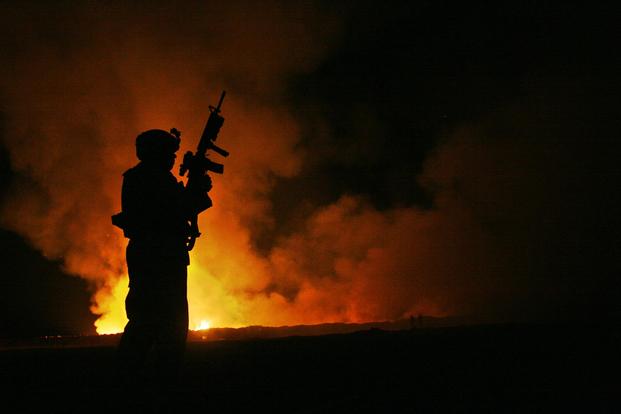Rep. Elaine Luria, D-Va., unveiled an ambitious and potentially costly legislative effort Thursday to open up compensation and health care to a large swath of veterans sick from exposure to burn pits, but some are concerned the bill doesn't go far enough.
The Conceding Our Veterans' Exposure Now and Necessitating Training Act aims to streamline the claims process at the Department of Veterans Affairs by doing away with most of the burden of proof on veterans to show they got sick from breathing in burning garbage for up to a year at a time while deployed.
Most efforts to entitle burn pit victims to health care have been stuck in Congress in a struggle often referred to as the post-9/11 generation's Agent Orange, due to stalled legislation and the difficulty some veterans face navigating the VA bureaucracy seeking disability compensation.
Read Next: Nearly Half of DoD Employees Got More Productive When They Started Teleworking
"This legislation is going to secure benefits for thousands of veterans who have sacrificed for their country only to be denied what they deserve," Luria, the chair of the Disability Assistance and Memorial Affairs subpanel of the House VA committee, said in a statement. "We cannot allow our veterans to face the same hardship as the veterans of past battles, who were exposed to toxins but waited decades for the research to catch up."
Luria's bill would cover veterans who served after Aug. 1, 1990, in Bahrain, Iraq, Kuwait, Oman, Qatar, Saudi Arabia, Somalia or the United Arab Emirates.
It also covers veterans who served after the 9/11 attacks in Afghanistan, Djibouti, Egypt, Jordan, Lebanon, Syria, Yemen, Uzbekistan, the Philippines or "any other country determined relevant" by the VA secretary.
Veterans would need only to prove they served in the affected areas during the covered time period and be diagnosed with one of the illnesses covered in the bill.
Illnesses covered in Luria's bill include:
- Asthma that was diagnosed after a period of service
- Head cancer of any type
- Neck cancer of any type
- Respiratory cancer of any type
- Gastrointestinal cancer of any type
- Reproductive cancer of any type
- Lymphoma cancer of any type
- Lymphatic cancer of any type
- Kidney cancer
- Brain cancer
- Melanoma
- Chronic obstructive pulmonary disease
- Constrictive bronchiolitis or obliterative bronchiolitis
- Emphysema
- Granulomatous disease
- Interstitial lung disease
- Pleuritis
- Pulmonary fibrosis
- Sarcoidosis
- Rhinitis
- Sinusitis
Luria's legislation directly competes with another bill reintroduced in the Senate by Sens. Kirsten Gillibrand, D-N.Y., and Marco Rubio, R-Fla. A House version of that bill is set to be reintroduced by Reps. Raul Ruiz, D-Calif., and Brian Fitzpatrick, R-Pa., in conjunction with an April 13 press conference to be held by the four lawmakers and veteran advocates including former "Daily Show" host Jon Stewart.
That bill also has the backing of key veteran groups, including the American Legion and Iraq and Afghanistan Veterans of America.

While Luria's proposal covers more illnesses -- including rhinitis and sinusitis -- it could end up being a less costly bill in the long run, thus potentially easier to pass into law by cutting a key provision that could draw the ire of advocates.
While Luria's bill has a larger roster of covered illnesses, it locks that list down and doesn't allow new conditions to be covered later, which could be an issue due to the dynamic nature of which new illnesses could be relevant from toxic exposure.
The Ruiz-Fitzpatrick-Gillibrand-Rubio bill uses the law providing health care to the victims of the 9/11 attacks as a blueprint, due to the similarities of first responders getting sick and dying from inhaling toxic debris. Both the 9/11 bill passed into law and the burn pit bill allow additional health ailments to be added later.
Rosie Torres, who founded the advocacy group Burn Pits 360, said Luria's proposal "isn't as comprehensive" and limits the care the VA could deliver.
"We appreciate they're using Gillibrand and Ruiz's as a template, but there are important provisions not in it," Torres said in an interview with Military.com. "We just don't know; there hasn't been enough time to see the full picture. With 9/11, they're still adding [sicknesses.]"
Another key difference between the bills is how a veteran would prove they were exposed. While Luria's bill outlines countries a veteran would have several ways to prove they served in, the other proposal would require a veteran to submit documentation that they received a campaign medal associated with the Global War on Terror or the Gulf War.
It is unclear whether there's a greater burden of proof by showing documentation for medals or proving service in a specific country. However, medals veterans are entitled to aren't always awarded or reflected in official records such as a DD-214. But there could also be barriers to veterans trying to prove they served in a specific country, such as no longer having access to their orders.
For decades, the military used open-air burn pits to dispose of garbage, paint, plastics, jet fuel and human waste. Now, some veterans are getting sick and dying from what they believe are cancers and other illnesses caused by breathing in the toxic fumes.

The issue has even touched the White House. President Joe Biden suspects his son Beau's death of brain cancer in 2015 was due to exposure to burn pits in Iraq; he served as a major in the Delaware Army National Guard. Some advocates and lawmakers believed the president's personal connection to the issue would ignite momentum on legislative action, but he has not mentioned burn pits since taking office.
It is unclear how many veterans are sick or have died from toxic exposure. From June 2007 to February this year, more than 13,900 veterans filed for disability claims for issues they believed were related to burn pit exposure. Less than 4,000 claims were granted, according to Luria's office. The VA has not responded to a request for additional data by Military.com
But the data probably doesn't show the scope of what could be a massive health crisis. The VA hasn't been clear on why some veterans get care and compensation and others are turned away. Right now, it can be difficult for a veteran to prove they served near a burn pit and connect that service to a disease.
More than 230,000 veterans have registered for the VA's burn pit data collection registry. The department estimates about 3.5 million veterans have been exposed to burn pits, according to a 2015 report.
Efforts to provide medical care to military victims of burn pits have long been plagued by delays in Congress and the VA. The VA maintains the science is not clear on diseases potentially caused by burn pit exposure. Advocates, however, have argued the department is stalling and repeating mistakes made with Vietnam veterans exposed to Agent Orange and World War II veterans exposed to radiation.
-- Steve Beynon can be reached at Steve.Beynon@military.com. Follow him on Twitter @StevenBeynon.
Related: Why 2021 Could Be a Game-Changing Year for Veterans Sickened by Burn Pit Exposure













